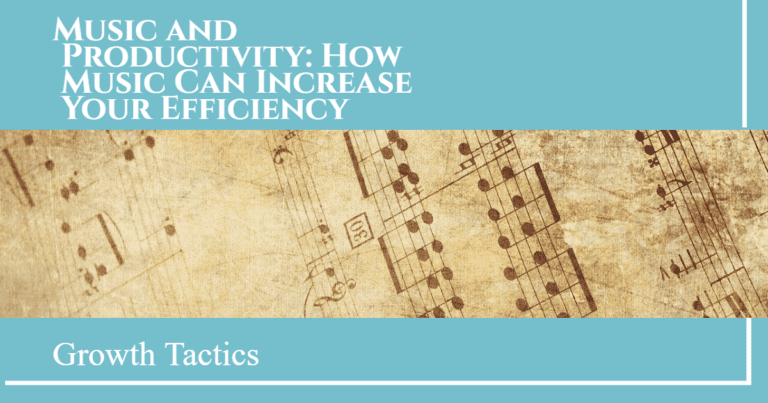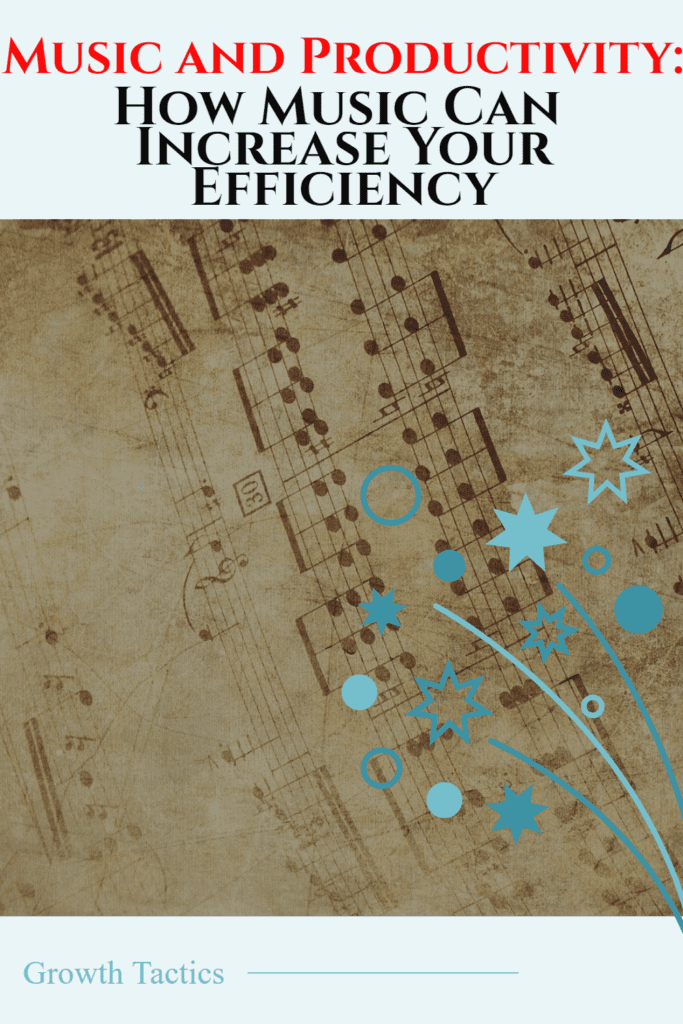Are you looking for ways to enhance your productivity? Well, you might be surprised to know that one effective method is as simple as listening to music. In this article, we will explore the fascinating relationship between music and productivity. Discover the type of music that can elevate your efficiency, how music affects your ability to concentrate, and the studies that confirm its positive impact. Get ready to unlock the power of music as a productivity tool!
Jump To Section
The Power of Background Music
When it comes to harnessing the potential of music for productivity, the key lies in choosing the right kind of background music. While some music styles may be enjoyable for leisure or recreational purposes, they may not contribute effectively to your productivity goals. The ideal background music should create a conducive environment that aids focus and concentration without becoming a distraction.
Classical music, known for its soothing and melodic qualities, has long been associated with increased productivity. The lack of lyrics allows the mind to remain engaged with tasks without diverting attention. Similarly, ambient music, with its atmospheric and gentle sounds, can create a calming and productive atmosphere. Another popular choice is lo-fi beats, blending smooth hip-hop rhythms with ambient textures, offering a pleasant backdrop that promotes focus and workflow.
By choosing the right type of background music, you can create an environment that supports your productivity goals and helps you stay on track. Experiment with different genres and styles to find the perfect musical companion for your work.
How Music Affects Focus
While music can be a powerful productivity tool, it’s important to consider the impact of lyrics on your ability to concentrate. For tasks that require deep focus, such as reading or writing, music with lyrics can prove to be distracting. The brain naturally tries to process and interpret the lyrics, which diverts attention away from the task at hand.
However, when it comes to simpler or repetitive tasks, music with lyrics can actually be beneficial. The rhythm and melodies can provide a motivating backdrop, making the task more enjoyable and helping to maintain productivity.
Instrumental music, on the other hand, allows for undivided attention and can enhance concentration. The absence of lyrics allows the mind to fully engage with the task, without the added cognitive load of processing language.
Ultimately, the choice between music with lyrics and instrumental music depends on the nature of the task and personal preference. Experiment with different types of music to find the optimal balance that maximizes your focus and productivity.
Remember, the goal is to use music as a tool to enhance your efficiency, so select the music that aligns with your specific needs and supports your workflow.
Studies Confirm the Link
While the benefits of music for productivity have been widely recognized, studies have further confirmed its positive impact.
A study conducted by researchers at the University of Miami found that participants who listened to background music while performing complex tasks showed significant productivity improvements compared to those who worked in silence. The study noted that the right music can aid attention-switching, enhancing an individual’s ability to switch between tasks and maintain focus.
Moreover, a study in the Journal of Music Therapy found that music can help alleviate symptoms of workplace burnout, significantly reducing stress and anxiety levels in individuals who listened to music regularly.
These studies and others like them highlight the powerful effects of music on productivity, from improved focus and concentration to reduced stress levels.
By integrating music into your work routine, you can experience these benefits firsthand and unlock your full potential for efficiency and productivity.
Tips for Incorporating Music into Your Productivity Routine
Now that you understand the benefits of music for productivity, here are some tips for effectively incorporating it into your daily work routine:
-
Create a playlist: Curate a playlist of instrumental music, classical pieces, or ambient tracks that you find relaxing and conducive to productivity. Having a designated playlist will save you time and effort in searching for suitable music each time you sit down to work.
-
Experiment with different genres: Explore different genres of music to find what works best for you. Classical music, jazz, electronic, or even video game soundtracks can all have a positive impact on focus and productivity. Pay attention to how each genre affects your mood and concentration levels.
-
Use headphones: When working in a noisy environment, headphones can help block out distractions and allow you to fully immerse yourself in the music. Noise-cancelling headphones are particularly effective in creating a serene and isolated work environment.
-
Adjust the volume: Find the right balance between audible and background music. The volume should be low enough to not be overpowering, but loud enough to create an engaging atmosphere.
-
Tailor music to tasks: Different tasks may require different types of music. For demanding tasks that require deep focus, instrumental music without lyrics may be more suitable. For routine or repetitive tasks, music with lyrics can provide stimulation and motivation.
-
Take breaks: Remember to take regular breaks from both music and work. Allowing your mind to rest and recharge can help maintain productivity levels over an extended period. Use these breaks to enjoy music as a form of relaxation.
By implementing these tips, you can optimize your productivity while enjoying the many benefits that music has to offer. So put on your headphones, create a playlist, and let the power of music accompany you on your journey to increased efficiency and focus.
Other Strategies to Eliminate Distractions
Music can be a fantastic tool for enhancing focus and productivity, but it’s not the only method available. Here are some additional strategies you can incorporate into your routine to further eliminate distractions:
-
Create a Distraction-Free Workspace: Designate an area solely for work, preferably away from high-traffic areas and common distractions. Keep your workspace clean, organized, and free from items that may divert your attention.
-
Minimize Digital Distractions: Turn off notifications on your phone and computer or use apps that can help block distractions temporarily. Consider using website-blocking tools to limit access to social media or other time-consuming websites during designated work periods.
-
Establish a Schedule: Setting a clear work schedule with specific time blocks for focused work can help train your mind to be more productive during those periods. Stick to the schedule as closely as possible and limit non-work-related activities during work hours.
-
Practice Mindfulness and Meditation: Incorporate mindfulness and meditation techniques into your daily routine to enhance focus and reduce mental distractions. Taking a few moments to center yourself and clear your mind before starting work can make a significant difference in your ability to concentrate.
-
Utilize Time Management Techniques: Techniques like the Pomodoro Technique, where you work in focused bursts with short breaks in between, can help you stay on track while avoiding burnout. Breaking your work into smaller, manageable tasks can also make it easier to stay focused and motivated.
-
Communicate Boundaries: If you work in a shared space or have family members at home, communicate your need for uninterrupted work time. Set clear boundaries and establish signals that indicate when you should not be disturbed.
-
Practice Single-Tasking: Multitasking can lead to reduced productivity and increased distractions. Instead, focus on one task at a time, complete it, and then move on to the next. This approach allows for better concentration and higher-quality work.
Remember, everyone has different distractions and methods that work best for them. Experiment with these strategies and discover what combination suits you and your unique work style.
By implementing a combination of these techniques and incorporating music as a supportive tool, you can create an environment that is conducive to deep focus and productivity. Say goodbye to distractions and hello to increased efficiency and success in your work.
Conclusion
Incorporating music into your productivity routine can be a game-changer. It has the ability to enhance focus, concentration, and overall productivity. Whether it’s the calming melodies of classical music, the ambient sounds of nature, or the rhythmic beats of lo-fi, finding the right background music can create an environment that supports your goals.
While lyrics in music can be distracting for certain tasks, instrumental music provides a perfect solution for deep focus and concentration. Additionally, studies confirm that music can help reduce stress and improve overall well-being in the workplace.
Remember, it’s important to experiment and find the right type of music that suits your preferences and work style. Use playlists, headphones, and adjust the volume to create a customized experience. And don’t forget to take breaks and allow yourself time to recharge.
So, why not harness the power of background music and make it a part of your productivity routine? Explore different genres, select the right tunes, and let the music become your motivational and productive companion. Get ready to unlock your full potential and achieve your goals with the aid of music.


